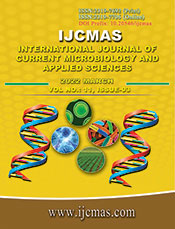


 National Academy of Agricultural Sciences (NAAS)
National Academy of Agricultural Sciences (NAAS)

|
PRINT ISSN : 2319-7692
Online ISSN : 2319-7706 Issues : 12 per year Publisher : Excellent Publishers Email : editorijcmas@gmail.com / submit@ijcmas.com Editor-in-chief: Dr.M.Prakash Index Copernicus ICV 2018: 95.39 NAAS RATING 2020: 5.38 |
The present study aims to identify the breeding sites and distribution of Aedes immature forms in selected tribal villages in West and South Tripura. The survey of aquatic habitats harboring mosquitoes were undertaken in five villages in West Tripura and six villages in South Tripura from September to November 2021. All water-holding containers were inspected for the presence of immature mosquito forms using pipette or dipper net based on container sizes. Adults were counted and observed under a Stereomicroscope following systematic taxonomic keys. A total of 330 immature forms were collected during the study period. Interestingly, no Aedes aegypti was found during the study while, Aedes albopictus was found to be relatively the dominant species in the study area. The house index (HI), container index (CI) and breteau index of West Tripura were 21.6%, 36.6% and 26.4% respectively whereas South Tripura were 20.66%, 33.3% and 26.6% respectively. The present study indicates the dominance of A. albopictus in the rural villages of both West and South Tripura. A considerably larger proportion of artificial productive containers viz. damaged tyres and broken plastic items in the surrounding residential areas highlights the urgency of its reduction efforts. Immediate intervention is required to reduce the water staging in tyres and other products during the cultivation of dragon fruit. This may provide a lucrative alternative for preventing the transmission of dengue and other arboviruses.
albopictus, Dragon fruit, Household Index, Container Index, Breteau Index
 |
 |
 |
 |
 |